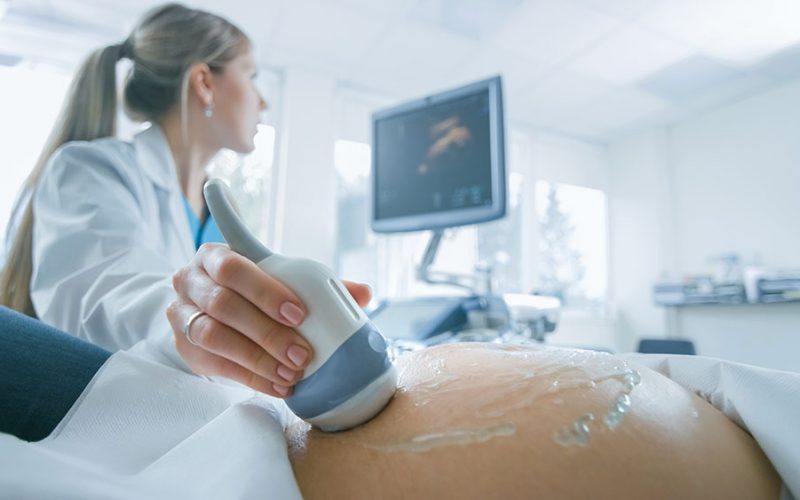Prenatal Ultrasound
 Having a healthy baby is the natural desire of every pregnant woman. But unfortunately, expectations of happy motherhood are not always fulfilled. About 5% of newborns have various congenital diseases. Screening in the first and second trimesters of pregnancy helps to determine the risk of congenital abnormalities in the unborn child.
Having a healthy baby is the natural desire of every pregnant woman. But unfortunately, expectations of happy motherhood are not always fulfilled. About 5% of newborns have various congenital diseases. Screening in the first and second trimesters of pregnancy helps to determine the risk of congenital abnormalities in the unborn child.
Currently, there are quite effective methods of prenatal diagnostics of many foetal diseases that can be detected from 11 weeks of pregnancy. Timely screening exams provide an opportunity to identify a wide range of foetal abnormalities and to see ultrasound signs of chromosomal abnormalities.
The first screening ultrasound
The first screening ultrasound is done at 11 - 13 weeks and 6 days, with a CRL (crown-rump length) of 45 to 84 mm. This is one of the most important examinations to determine the risks of chromosomal diseases, the leading ones are Down, Edwards and Patau syndromes. Ultrasound assesses markers of these diseases: thickness of the collarspace, presence of nasal bone, pulsatile index in the venous duct, and tricuspid regurgitation. Additionally, blood tests for proteins associated with chromosomal abnormalities are taken at this time: PAPP-A and beta HCG. Based on these two studies it is possible to calculate the risk of having a child with chromosomal syndrome during the current pregnancy. The first screening ultrasound also examines all vital organs: stomach, bladder, anterior abdominal wall, intestines, quadricameral heart, brain structures, facial structures, arms and legs, spine. Non-embryonic parts are also assessed: umbilical cord, chorion, cervix, myometrium, including myomas and scars after caesarean section. Sex determination is 80-95% possible at these times, depending on CRL, foetal position and imaging features.
Why is it so important to have the first pregnancy screening in this period? The fact is that ultrasound markers of chromosomal abnormalities are informative from the 11th week to the end of the 13th week. During this period it is possible to clearly assess them according to the recommendations of the Foetal Medicine Foundation, London, UK. Proteins in the blood decrease in concentration also after the 14th week. All ultrasound doctors must be licensed to conduct screening for chromosomal abnormalities.
The second screening ultrasound
The second screening is performed between the 18th and 21st weeks. This study excludes most abnormalities of various organs and systems: gastrointestinal tract, central nervous system, urinary and genital systems, heart, lungs, musculoskeletal system. Markers of chromosomal abnormalities in the second trimester are also assessed (length of the nasal bone, thickness of the cervical fold, renal pelvis, foot and hand structure, etc.). The sex of the foetus is mandatory for examination, the accuracy of its determination is not difficult with the normal development of the genital organs.
The third screening ultrasound
The third pregnancy screening is performed between the 30th and the 34th weeks. Some rare malformations have a late manifestation. This requires their exclusion during this study. The doctor also observes the development of the brain, the appearance of new furrows and gyrus, and assesses all the vital organs in dynamics and the baby's growth rate.
Dopplerometry, an ultrasound examination of blood flow in the uterine arteries, umbilical cord, cerebral arteries, etc., is very important. This study can detect risks of intrauterine hypoxia, possible causes of growth retardation, fetoplacental insufficiency, which is very important for the tactics and timing of childbirth. 3D and 4D ultrasound technologies allow you to see a three-dimensional picture of the baby, but from a medical point of view, these modes are not very informative.
Where are the screening tests carried out?
Prenatal diagnostics with high accuracy allows diagnosing many congenital foetal malformations if only expert level examinations are carried out. First of all, it implies high qualification of the doctor, who has received a specialisation and who has certificates of the International Foetal Medicine Foundation for conducting screening tests in the 1st and 2nd trimesters, as well as conducting tests on ultrasound equipment of expert class. This is why it is advisable to have screenings only in specialised prenatal diagnostic departments or clinics.
Pregnancy is certainly one of the happiest, but also the most exciting moments in any woman's life. Timely examination will help an expectant mother gain confidence in the health and proper development of the baby.
How to make an appointment for screening?
If you have decided to make an appointment with a specialist at JSC "Medicina" (Academician Roytberg Clinic) in the Central Administrative District, please call +7 (495) 845-39-61. We are located in the centre of Moscow at the address: 2nd Tverskoy-Yamskoy Lane, 10. The following metro stations are nearby: "Mayakovskaya", "Belorusskaya", "Novoslobodskaya", "Tverskaya" and "Chekhovskaya".




